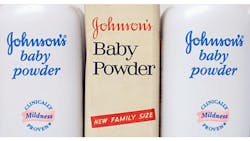Johnson & Johnson (IW 1000/51) must pay $72 million to the family of a woman who blamed her fatal ovarian cancer on the company’s talcum powder in the first state-court case over the claims to go to trial.
Jurors in St. Louis on Monday concluded J&J should pay $10 million in compensatory damages and $62 million in a punishment award to the family of Jackie Fox, who died of ovarian cancer last year after using Johnson’s baby powder and another talc- based product for years.
It’s the first time a jury has ordered J&J, the world’s largest maker of health-care products, to pay damages over claims that it knew decades ago that its talc-based products could cause cancer and failed to warn consumers.
“We have no higher responsibility than the health and safety of consumers and we are disappointed with the outcome of the trial,” Carol Goodrich, a J&J spokeswoman, said February 23 in an e-mailed statement. “We sympathize with the plaintiff’s family but firmly believe the safety of cosmetic talc is supported by decades of scientific evidence.”
J&J is facing about 1,200 suits claiming studies have linked its Johnson’s Baby Powder and its Shower-to-Shower product to ovarian cancer. Women contend the company knew of the risk and failed to warn customers.
‘Decisive’ Documents
The jury foreman, Krista Smith, called the company’s internal documents “decisive” for jurors, who reached the verdict after four hours of deliberations.
“It was really clear they were hiding something,” said Smith, 39, of St Louis. “All they had to do was put a warning label on.”
Allen Smith, a lawyer for the family, said, “It was a just verdict given the horrible conduct of Johnson & Johnson.”
J&J marketed its Shower to Shower brand talc for feminine hygiene. One 1988 ad promised “just a sprinkle a day keeps odor away.” Valeant Pharmaceuticals International Inc., which acquired the Shower to Shower brand in 2012, wasn’t a defendant in the St. Louis case.
Wallboard, Balloons
Talc is used in products as varied as wallboard and the powder that keeps elastic balloons from sticking together. Baby powder is estimated to be an $18.8 million market in the U.S., according to the Statistic Brain Research Group. About 19%t of U.S. households use J&J’s brand, according to another research group, Statista.
Cornstarch has been widely substituted for talc as an absorbent in baby powder and feminine hygiene products. The American Cancer Society advised in 1999 that women use cornstarch-based products in the genital area.
J&J, which introduced a baby powder using cornstarch in the 1970s, continues to offer products that include talc and maintains the substance is safe.
In Fox’s case, her family’s lawyers urged jurors to find J&J officials hid its talc products’ health risks and should pay at least $22 million in damages.
J&J officials “will not change their behavior until good people like you act,” Allen Smith, one of the family’s attorneys, told the St. Louis jury in closing arguments on Monday.
Proof Issue
J&J’s lawyers countered that the family couldn’t prove the company’s talcum-based products directly caused or contributed to the development of Fox’s cancer.
“The evidence is very clear” that the cause of the cancer was unknown, Gene Williams, one of the drugmaker’s lawyers, argued to the jury.
The case is the first in which a jury has awarded damages over J&J’s talc products. A federal jury in North Dakota found in 2013 that a woman’s use of its talc-based body powder contributed to her developing ovarian cancer. The panel awarded no damages, however.
About the Author
Bloomberg
Licensed content from Bloomberg, copyright 2016.
